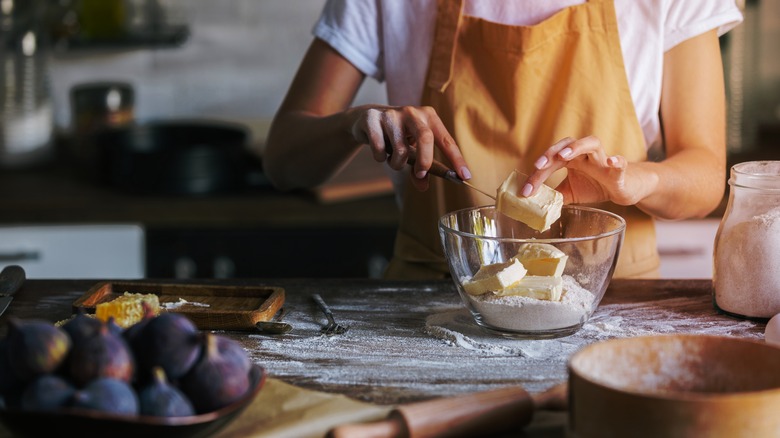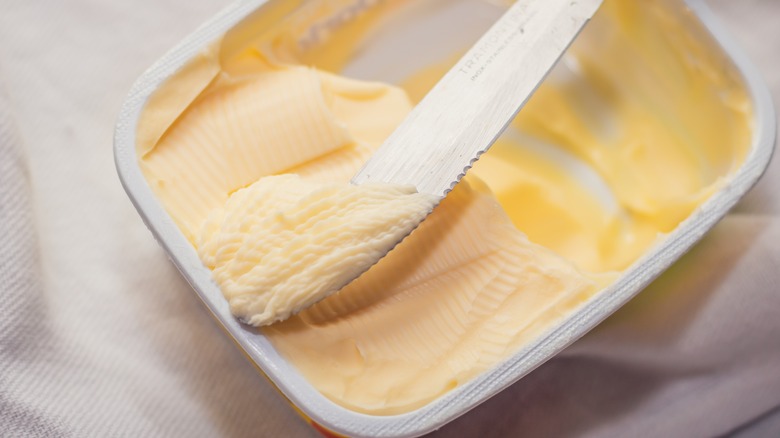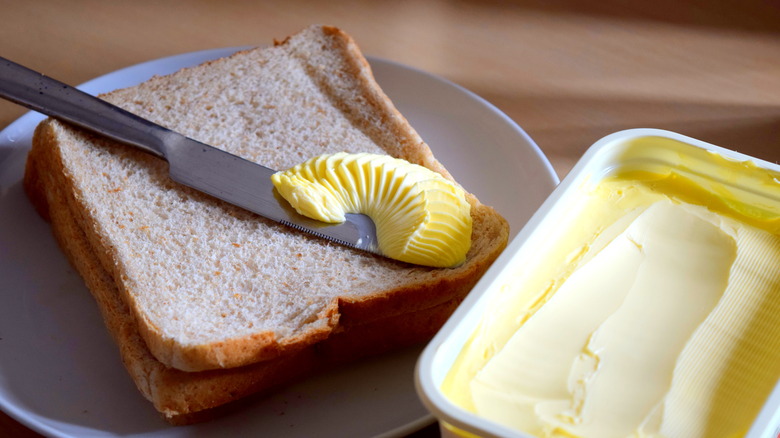The Best Butter Substitute For Pillowy Soft Baked Goods
Can't believe it's not butter? That's because it's probably margarine — butter's close cousin in taste and feel. Not only is it a suitable alternative to spread atop toast, but it's a convincing and nearly undetectable substitute in recipes for baked goods that traditionally call for butter. While food trends come and go, butter has (for the most part) remained in vogue in recent years, establishing itself as a staple in most everyone's fridge and heart. Butter is a must-have for achieving the perfect crisp on a grilled cheese, and some people even swear by drinking coffee with butter. But margarine? Amidst the ebbs and flows of foodie fads, margarine's moment to shine was decades ago. It had its moments in the 70s, the 80s, and earlier decades, before the population at large became aware of the dangers of trans fat and moved back to butter.
Nowadays, the name "margarine" itself seems to conjure up images of faded recipes from your grandma or Country Crock tubs repurposed as leftover food containers. But before you relegate it to the dustbins of food history, it might be worth keeping a tub of margarine in the fridge, as it makes for an excellent substitute for baked goods. Simply use a 1-to-1 ratio. You can swap in margarine for many different recipes — bread, cookies, cakes, pie crusts, or just about any baked good in which you'd typically use butter — for a substitute so satisfying you may decide to never go back.
Why margarine lends a light airy quality to your pastries or cakes
If you've ever been cloudy or downright confused about the difference between butter and margarine, or how — if at all — the two can be swapped out and used interchangeably, you're not alone. While everyone knows butter is dairy-based, margarine's reputation as a cheap knockoff is about where many folk's understanding of the product itself starts and ends. To provide a basic definition, margarine is a vegetable oil-based product containing the addition of water, flavoring, and typically (but not always) no dairy; unlike butter. Due to its high water content, using margarine in your baked goods results in softer, lighter, and airier mouthfeels and textures, versus the heftier crisp and stronger flavor that butter yields.
While it may look, spread, and bake similarly — if there are any instances where you may want to stick with real butter, it should be in recipes where you want that crisper crunch, or in baked goods where the trademark buttery taste is front and center. Think flaky croissants, for example. With that being said, if you're avoiding dairy or looking for a cheaper alternative to butter, it's still totally possible to achieve a flaky and delicious baked good with margarine alone. If you want the best of both worlds, and you're curious about if you can mix butter and margarine for creamy cookie dough and other baked goods, the answer is often yes!
Margarine and plant-based butter are nearly identical — sometimes
Margarine has a hard time getting out from under its less-than-glowing reputation of being laden with unhealthy, processed fats. The truth of the matter is, while most margarine was made primarily with trans fat in decades past — with many people avoiding it altogether in order to watch their heart health — margarine brands have quietly cleaned up, revising formulas to instead use unsaturated vegetable fat as a base.
While margarine may still be overdue for a rebrand if it ever wants to achieve the same following and love that butter has, another option in the family of creamy spreads and baking sticks is plant-based butter, a super close cousin to margarine. Numerous options have popped up on shelves in recent years as demand for dairy-free and vegan products has exploded. What you might not realize is that many of the dozens of vegan butter options at grocery stores are essentially margarine, masquerading under chicer branding.
Although today's margarine and plant-based butter alternatives are each made with vegetable oils and other additions instead of dairy, certain brands of margarine on shelves still also contain buttermilk, or other milk derivatives, lower down the ingredient list. This means that while vegan butter is essentially margarine, not all margarine is vegan. Always check the label carefully if you're dairy-averse. Whether you choose fully vegan plant-based butter or traditional margarine, feel free to swap in either for butter in your baked goods, and you'll feel the pillowy difference.


